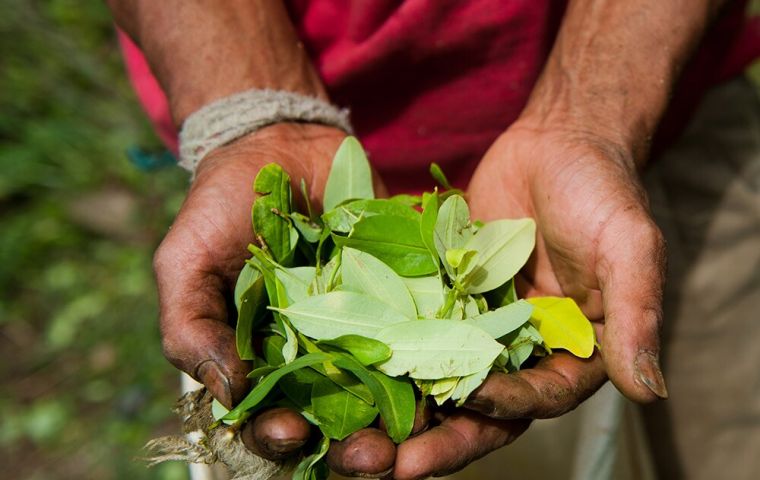MercoPress. South Atlantic News Agency
Colombia to endorse Bolivia's bid to remove coca from list of banned substances
 The Uruguay-born Gil insisted authorities should tackle the mafias behind the illegal cocaine business, not peasants chewing coca leaves
The Uruguay-born Gil insisted authorities should tackle the mafias behind the illegal cocaine business, not peasants chewing coca leaves The Colombian government of leftwing President Gustavo Petro announced it will endorse Bolivia's request before the United Nations (UN) for the declassification of the coca leaf as a narcotic drug, it was reported.
Colombia and Bolivia will propose to the UN Commission on Narcotic Drugs to accept the traditional use of coca leaf and remove it from the list of banned substances, Deputy Foreign Minister Laura Gil explained this week. She added that the initiative will be put forward during the 66th session of the United Nations Commission on Narcotic Drugs to be held from March 13 to 17 in Vienna, Austria.
“Bolivia undertook more or less ten years ago an initiative to achieve the legalization of the traditional use of coca. What they did was to denounce the Convention on Narcotic Drugs,” the Uruguay-born Gil said.
In January of this year, Bolivian President Luis Arce Catacora announced that his government was taking steps to declassify coca as a narcotic so that it can be freely marketed.
Gil highlighted the new approach to an old issue: It is necessary to “begin to destigmatize the discussion on the drug problem,” she argued. The high-ranking official also stressed that peasants, who make up the most fragile link in the chain, are not the ones who should be attacked, and insisted authorities should tackle the mafias behind the illegal cocaine business. Hence the importance of removing “the coca leaf” (not to be mistaken for cocaine) from the list of prohibited substances.
“That is why the president insists so much that we have to reinforce interdiction in terms of security, but not penalize the peasantry with forced eradication,” she said. Traditional uses of coca leaves have been recognized on many occasions as part of the identity and collective memory of Colombian, Bolivian and other indigenous communities in the Andean region. It has been traditionally considered by many indigenous peoples as a sacred plant of great nutritional and curative value and is part of a millenary ancestral knowledge.




Top Comments
Disclaimer & comment rulesCommenting for this story is now closed.
If you have a Facebook account, become a fan and comment on our Facebook Page!